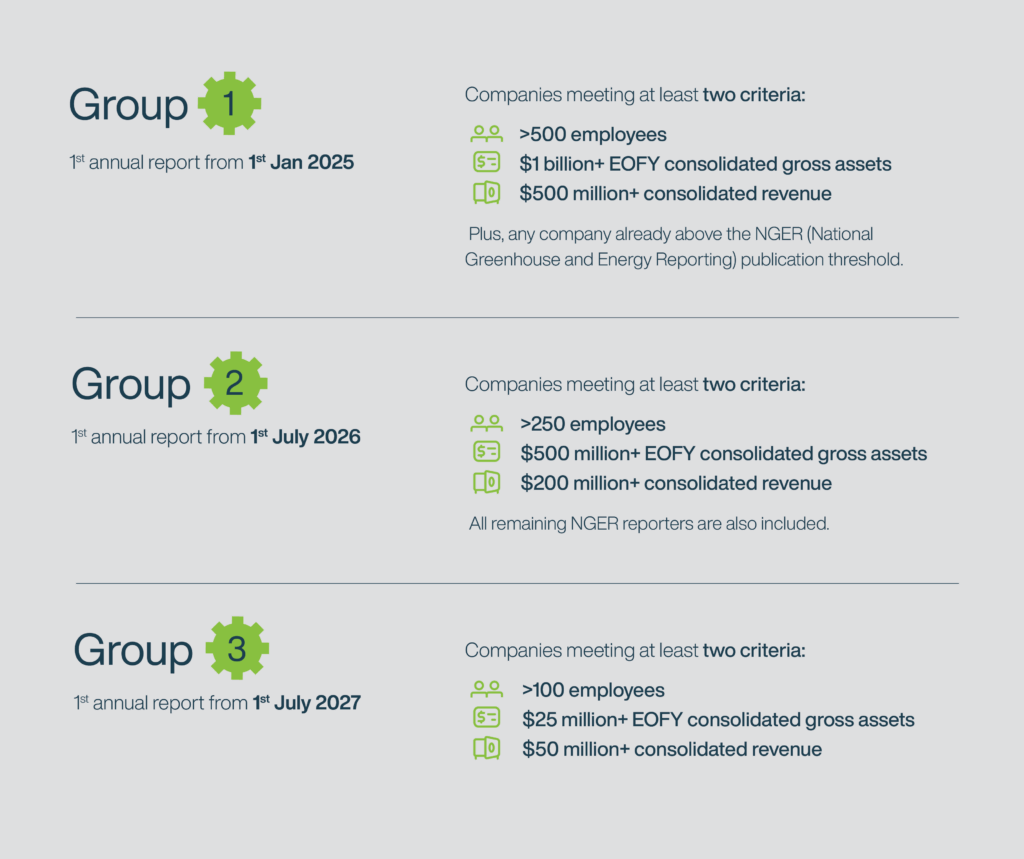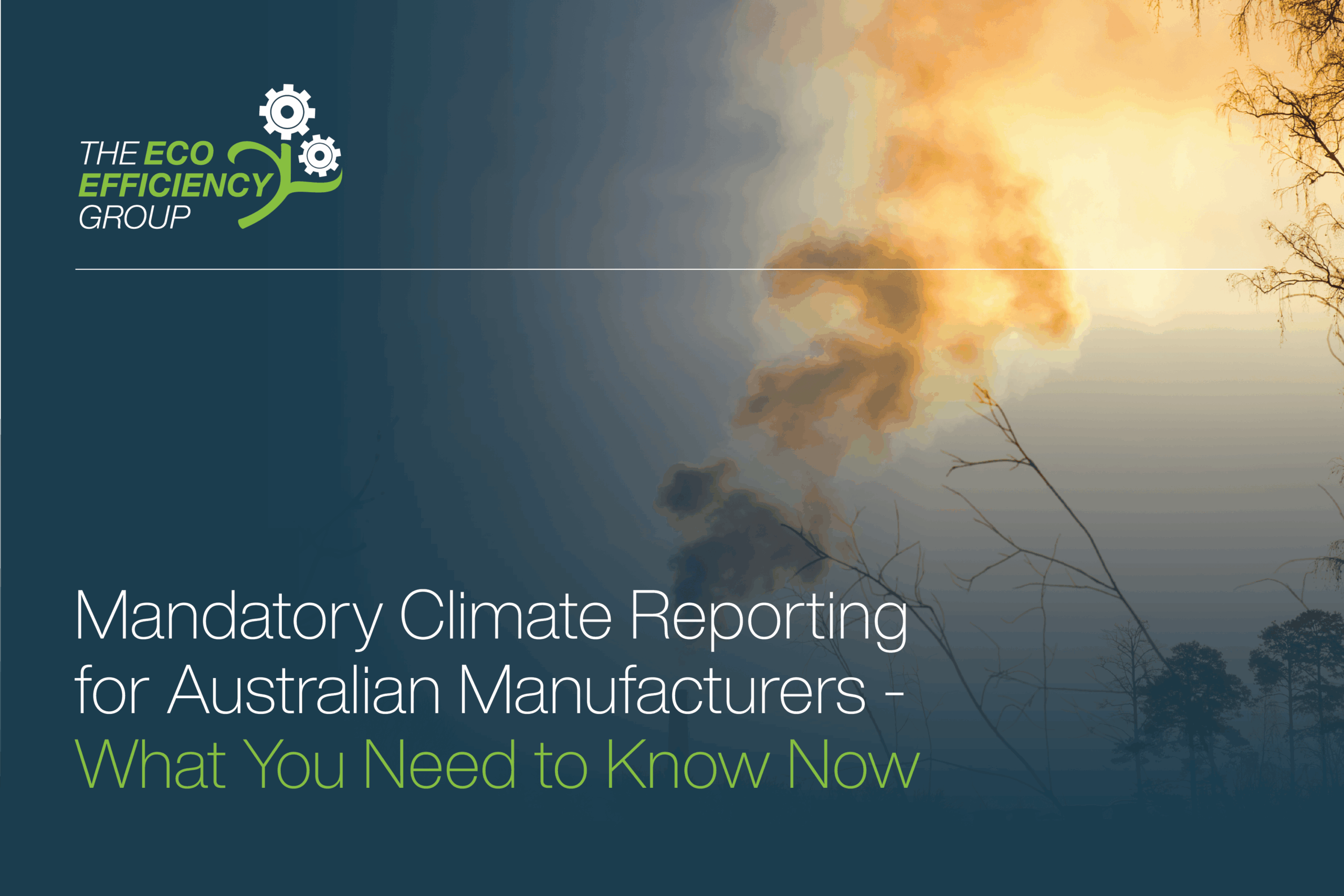Manufacturing success comes from knowing your operations inside and out – energy use patterns, material flows, waste streams, supplier performance. This knowledge helps to fully understand business risk. Climate reporting applies this same principle.
Australia’s mandatory climate-related financial disclosure requirements are rolling out now, with Group 1 entities public reporting next year and broader requirements coming for mid-sized manufacturers through 2026.
Leading manufacturers are recognising what this transition period offers: time to establish robust measurement systems and governance frameworks that will become standard practice.
Companies that build carbon management capabilities now will be better positioned to identify efficiency opportunities, manage risks and demonstrate their sustainability leadership.
Who's Affected and When
The phased rollout means companies (including manufacturers) face different timelines – here’s an overview of the three entity categories:

Companies that don’t meet these thresholds are likely to get data requests from those that do. Getting clarity on timelines and requirements now means you can prepare thoroughly and deliver business value beyond compliance.
What You Need to Report
The new reporting framework covers the following core areas that collectively paint a comprehensive picture of your climate-related business exposure:
- Governance and Strategy – how your board and management integrate climate considerations into business decisions and long-term planning.
- Risk Management – processes for identifying, assessing and managing climate-related hazards and risks.
- Metrics and Targets – the quantitative foundation of your climate reporting, including greenhouse gas emissions across three scopes:
- Scope 1: Direct emissions from your operations, for example, from fuel combustion and industrial processes you directly control
- Scope 2: Indirect emissions from purchased electricity, steam, heating and cooling
- Scope 3: Includes emissions up and down your supply chain and those associated with your financing or investment activities
Scope 1 and 2 emissions are required to be reported from year one. Scope 3 reporting begins in year two, with businesses able to use emissions data up to 12 months old to accommodate preparation time.
Building Your Mandatory Climate Reporting Foundation with TEG
TEG has worked extensively with Queensland manufacturers across the food processing, foundry, fabrication and engineering sectors.
We understand the practical challenges manufacturers face in measuring and managing their climate risk – from multi-site resource management to complex supply chain emissions.
Our Expertise Covers:
Gap Analysis & Roadmapping
- Explaining reporting requirements and the data needed to meet them to help you and your staff understand what’s involved
- Assessing your current position and identifying gaps in where you need to be
- Preparing a realistic roadmap that integrates with your operational workflow
Carbon Footprint Assessment
- Comprehensive assessment of greenhouse gas emissions from each site in your business
- Easy-to-understand carbon footprint spreadsheets and reports with strategic positioning insights
- Methods compliant with Greenhouse Gas Protocol, Climate Active and NGER requirements
Climate Hazard & Risk Analysis
- Connecting your operations to climate science, assessing exposure to bushfires, flooding, storms and heatwaves under current and future scenarios
- Linking physical and transitional risks to your business risks
- Analysis of current conditions and future global warming scenarios (including 1.5°C and 2.5°C scenarios required for mandatory reporting)
Reporting & Strategy
- Meeting mandatory disclosure requirements, adopting voluntary reporting or satisfying customer sustainability commitments
- Advising on offsets tailored to your business in the form of Australian Carbon Credit Units (ACCUs), Large-scale Generation Certificates (LGCs), suppliers’ offsets or other types of offsets
- Emissions reduction scenario modelling to assess strategy and costs, and help set targets
- Templates and guidance that streamline your reporting processes
Whether you’re facing immediate reporting requirements or preparing for future obligations, early action leads to better outcomes.
Ready to get started with your carbon management and climate risk strategy?
Contact our team to discuss how we can help you navigate mandatory climate reporting requirements and build the governance and data management foundations that will serve your business long-term.
Reference: https://www.asic.gov.au/about-asic/news-centre/find-a-media-release/2024-releases/24-205mr-asic-urges-businesses-to-prepare-for-mandatory-climate-reporting/

